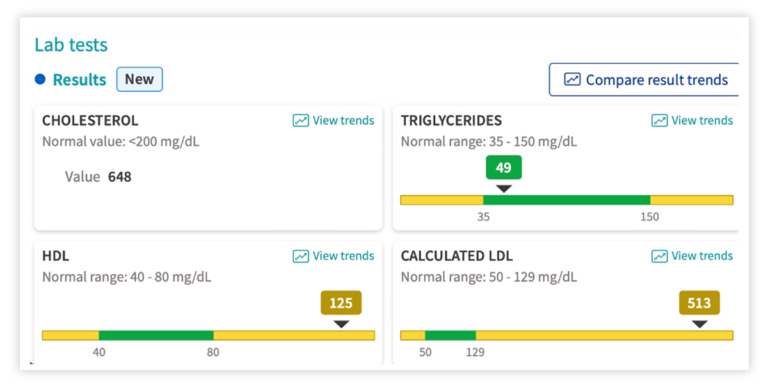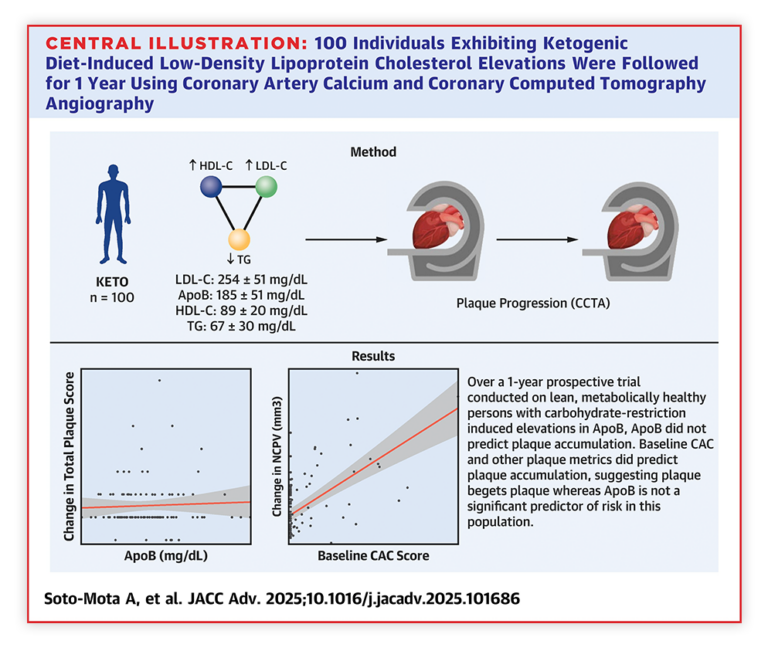We’ve all heard the horror stories: A person goes on a ketogenic diet and despite finding relief from disease and improvements in well-being, their LDL “bad” cholesterol shoots through the roof. What should they do?
New research colleagues and I published in the Journal of the American College of Cardiology Advances suggests that not all people with extremely high LDL on ketogenic diets are at high risk for cardiovascular disease.
This research followed 100 lean, healthy people on ketogenic diets with extreme elevations in LDL cholesterol and the associated biomarker, ApoB, on ketogenic diets. Average LDL cholesterol level was 254 mg/dl with some participants exhibiting LDL levels >500 mg/dl. Participants had been on ketogenic diets for an average of 4.7 years before starting the study, at which point they exhibited the same or less plaque in their hearts’ arteries than a matched control population. The keto participants were then followed for a year using high-resolution coronary CT angiography to see how much their plaque progressed.

Strikingly, the majority of most participants showed no or minimal progression of coronary plaque, and neither ApoB nor LDL exposure predicted plaque progression.
This contradicts the conventional point of view that very high LDL and ApoB levels more or less “equal” heart disease. These data demonstrate that you can have very high LDL and ApoB on a ketogenic diet and remain at low overall risk for plaque progression.

However, that does not mean being metabolically healthy makes you immune to heart disease. While the population overall exhibit minimal progression of coronary plaque, those participants who had calcified plaque at baseline did exhibit overall progression. In our analyses, we found that while LDL cholesterol and ApoB levels did not predict plaque progression, baseline plaque levels did predict plaque progression. This was true both for those with and without baseline plaque.
So, the question that follows is: Why? Why does plaque beget plaque. If LDL cholesterol and ApoB aren’t the villain, what it? It’s not entirely clear. One possibility is that years of poor metabolic health prior to adopting a ketogenic diet cause plaque development in some people that has a tendency to “snowball.” But more research will be needed to discover why pre-existing plaque begets more plaque and why some people have the opposite response on a ketogenic diet: plaque regression. Yes, six participants exhibited plaque regression.
Like any good research, this paper creates as many questions as it answers. But one thing is certain, these data are groundbreaking. They are making a stir, and rightly so.
If you want to learn more, we encourage you to read the paper (and share the paper, with link, in an original post on X to help the algorithm). Also, please watch the video covering the paper and engage across social media platforms: X, Instagram, LinkedIn and so on.
“While these data don’t entirely overturn the conventional view of heart disease, they certainly expose a major blind spot.”
Nicholas G. Norwitz,
PhD, University of Oxford
& Harvard Medical School
This blog is provided for informational purposes only and should not be considered a replacement for professional medical advice, diagnosis, or treatment. If you have any questions about a health condition or concerns related to your well-being, always consult with your physician or another qualified healthcare professional.

 Nicholas Norwitz, PhD
Nicholas Norwitz, PhD

